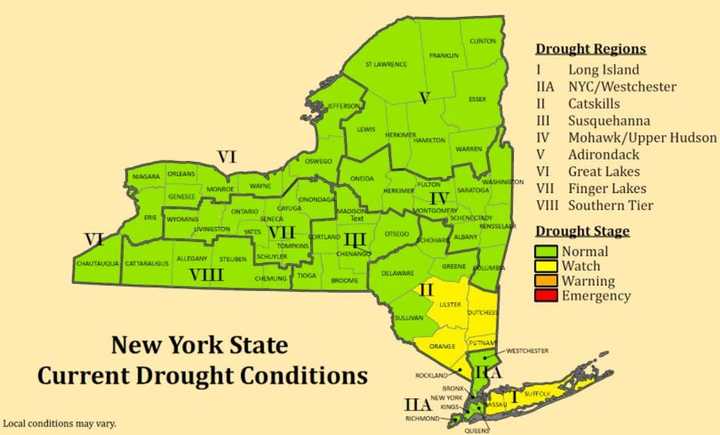The State's Drought Management Task Force updated the drought status to "Normal" from "Drought Watch" for multiple regions including most of upstate New York because of recent rainfall and higher levels of ground and surface water.
"Despite the encouraging hydrological conditions, all New Yorkers are urged to continue reducing unnecessary water waste, fixing leaks, and choosing efficient water fixtures," the New York State Department of Environmental Conservation (DEC) said in a statement
The following counties (shown in yellow in the first image above) will remain in Drought Watch designations due to ongoing precipitation deficits, unseasonably low streamflows, and groundwater declines:
- Dutchess,
- Nassau,
- Orange,
- Putnam,
- Rockland,
- Suffolk,
- Ulster.
In mid-August, a drought watch was in effect for about half the state's 62 counties. (Click on the second image above.)
New York State drought region IIA, which includes New York City and Westchester, remains in normal status due to the satisfactory storage levels and refill probability of the New York City reservoirs.
According to the New York City Department of Environmental Protection (DEP), the city's reservoirs are approximately eight percent below normal for this time of year, with 295 billion gallons currently in storage, compared to 332 billion gallons normally.
To protect water resources, homeowners in regions under Drought Watch are encouraged to voluntarily reduce outdoor water use and follow these tips:
- Water lawns only when necessary, choose watering methods that avoid waste, and water in the early morning to reduce evaporation and maximize soil hydration;
- Reuse water collected in rain barrels, dehumidifiers, or air conditioners to water plants;
- Raise lawn mower cutting heights. Longer grass is healthier with stronger roots and needs less water;
- Use a broom, not a hose, to clean driveways and sidewalks; and
- Fix leaking pipes, hoses, and faucets.
Click here to follow Daily Voice Hudson and receive free news updates.

